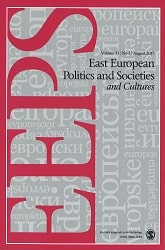“To Cure, Uplift and Ennoble the Village”: Militant Sociology in the Romanian Countryside, 1934–1938
“To Cure, Uplift and Ennoble the Village”: Militant Sociology in the Romanian Countryside, 1934–1938
Author(s): Raluca MuşatSubject(s): Cultural history, Social history, Applied Sociology, Social development, Rural and urban sociology, Interwar Period (1920 - 1939)
Published by: SAGE Publications Ltd
Keywords: sociology; Carol II; Gusti; peasantry; modernization; interwar; culture; Romania;
Summary/Abstract: Focusing on the project of cultural work (muncă culturală), involving hundreds of university students from different disciplines going to the countryside to study rural life and to aid its modernisation, this article examines the prominent role sociology played in King Carol II’s Romania as a scientific tool for planning rural reform and as a practical project of mass social organisation. Designed and launched by the sociologist Dimitrie Gusti in 1934, cultural work competed with the fascist Legion of the Archangel Michael’s work camps, providing an “official” project of rural modernisation, meant to bridge the gap between the educated youth and the peasantry and increase support for the King. Largely ignored by scholars of this period, this project offers a new perspective on the country’s social, political, and intellectual history, one that concentrates on the “rise of the social” in Romania, to which the transformation of the peasantry was central.
Journal: East European Politics and Societies
- Issue Year: 27/2013
- Issue No: 03
- Page Range: 353-375
- Page Count: 23
- Language: English
- Content File-PDF

